This guide provides a structured approach for chatting with older relatives and friends about their memories of life in Ireland long ago, as well as for speaking with people of Irish descent living abroad about their heritage. It outlines specific questions and themes to help keep the conversation flowing.
Family history is much more than just tracing names on a family tree. Oral heritage – the stories, memories, traditions and beliefs passed down through generations – offers invaluable insights into how people lived, what they valued and how events in history shaped their lives. It can bring the past to life!
A D V E R T I S E M E N T
Whether you’re conducting genealogical research or simply curious about life long ago, speaking with elderly people can reveal details about their daily lives and personal experiences, as well as the lives of those who came before them, much of which is not contained in official records. If someone is hesitant to share, starting with informal chats about everyday life in the past can often open the door to deeper discussions. Looking through old photos or handling heirlooms during your chat can usually spark memories, but knowing the right questions to ask is just as important.
Below is our guide to help you structure these conversations with your parents, grandparents, other older relatives, friends and neighbours.
Sign up to our newsletter
It must be acknowledged that some individuals will be unwilling to share their memories or family stories for a variety of reasons. While it can be frustrating to know that potentially valuable information is out of reach, it’s essential to respect their boundaries.
Questions to unlock stories from the past
Here, you’ll find a comprehensive list of questions and themes for older people living in Ireland, with additional questions further down for those with Irish heritage living outside the country. You may need to adapt some questions depending on your relationship with the person you’re speaking with, their age and where they lived. Remember, the goal is not just to collect names and dates but to preserve the stories and experiences that reflect the richness of life in days gone by, as seen through the eyes of those who lived it.
Download and save this FREE questionnaire as a printable PDF
Ancestry
- Can you tell me a bit about your parents, siblings, grandparents or any other relatives?
- Who’s the oldest relative you remember meeting as a child?
- Do you have any historical family documents (official records, letters, diaries)?
- Are there any heirlooms in the family with interesting stories?
- Do you know any family lore that has been passed down through the generations?
Our family and the local area
- Where were you born? At home or in a hospital?
- Where did you grow up?
- How long has our family lived in this area? Where did they come from before that? Did they move around a lot?
- Was there a strong sense of community when you were growing up?
- Can you describe the standout figures and businesses in the community during your childhood?
- Did our family play a role in local business, events or organizations?
- Was there a community gathering place, like the local shop, pub or hall?
- Can you describe any significant changes in the local area that you’ve witnessed?
A F F I L I A T E A D

Daily life
- Can you describe the house you grew up in? Were there any outbuildings?
- What were typical family dinners and meals like in your household? Were there any foods that were considered “luxuries” or special treats?
- Did you have any pets growing up?
- Were you tasked with any chores as a child?
School life
- What was school like?
- How far did you have to travel to school? How did you get there?
-
Are there any classmates, teachers or incidents that stand out in your memory?
- What was your best subject in school?
- Did you get into trouble much? What methods of discipline were used?
- Did you attend secondary school, a technical school, college or university? Did you complete an apprenticeship? How far did you progress?
Working life
- As a child, what did you want to be when you grew up?
- What was your first job? How much did you get paid?
- Have you ever worked on the family farm or in the family business?
- What other jobs have you had?
- Did you ever run your own business?
-
Are there any colleagues, bosses, employees or work-related incidents that stand out in your memory?
- Did you face any challenges in finding work or making a living?
- Did you ever take part in a strike?
- Were there any specific professions, careers or trades common in our family or the local area?
.
Marriage and parenthood
- How did you meet your other half?
- Tell me about the proposal.
- Where was your wedding held? Who attended?
- What memories stand out from your wedding day?
- Did you have a honeymoon? Where did you go?
- When did you find out your first baby was on the way?
- How did you adapt to parenthood? How did you balance work and raising children?
- Tell me about your children. Why did you choose those names for your children?
Farming
- What crops were commonly grown? What animals were reared?
- How did farming practices and the use of land change during your lifetime? Did you notice any changes after Ireland joined the European Economic Community (EEC, later the EU)?
- Have you seen a decline in small farms over the years?
- Did you notice many people leaving farming for other types of work?
- Do you remember the milk crisis in the 1970s when farmers were forced to pour gallons of milk down the drain?
- Do you remember the 1978 Dublin milk shortage and the milk workers’ strikes?
- What are your memories of the mad cow disease (BSE) and foot-and-mouth disease outbreaks?
Technology and modern conveniences
- Did you have electricity in your home when you were growing up?
- How was your home heated?
- Did you have a well for water?
- Did you have indoor plumbing?
- Did you have an indoor toilet or an outhouse?
- How did you travel places? Did your family own a car? When did you get your first car?
- Was there a television, radio or telephone in your home when you were growing up?
- What are your earliest memories of computers?
- What are the biggest changes in technology you’ve seen in your lifetime?
A F F I L I A T E A D

Health and medicine
- What were some of the most common illnesses and diseases that affected people when you were growing up? How were they treated?
- Do you remember any traditional cures or home remedies being used?
- Did you or any member of your household experience any serious illness?
- Was there a local doctor or hospital?
- Were births generally at home or in hospitals?
- Do you remember hearing if anyone in our family was affected by the 1918–20 Spanish Flu?
- Do you recall any outbreaks of tuberculosis (TB), polio or scarlet fever?
Religious practices
- How important was religion in your household growing up?
- How often did you attend Mass or go to church?
- Did you say daily prayers like the Rosary?
- Do you remember any specific prayers or blessings?
- What role did the parish priest play in the local community?
- Did our family or local community have a particular devotion to a saint?
- Did you ever perform pilgrimage rounds or visit a holy well?
- Did your family ever hold a station Mass in your home?
Traditions and customs
- What superstitions were common when you were growing up?
- Do you remember any old songs, poems, rhymes, proverbs or sayings?
- Can you remember specific customs around wakes, burials, weddings or christenings?
- How did you celebrate birthdays, Christmas, St Patrick’s Day, Easter and Halloween?
- Did you learn any special recipes from your parents or grandparents?
Fun and recreation
- What did you do for fun?
- What games did you play?
- What toys did you own?
- Did you play any sport?
- Were you part of any clubs, societies or local organizations?
- Did you attend GAA matches?
- Did you go fishing? Where was your favourite fishing spot? What fish did you catch?
- Did you play any musical instruments? Sing in a choir?
- Did you attend céilí dances? See showbands perform?
- What were the circuses, fairs or festivals like when you were growing up?
- Did you go to the cinema? What type of films did you watch?
- Did you visit the local pub much?
- Did you go on summer holidays?
- Did you visit the seaside?
- What music, fashion and hairstyle trends were popular when you were growing up?
Please help support
Irish Heritage News
A small independent start-up in West Cork
Give as little as €2
Thank You
Irish language
- Was Irish ever spoken in your household or community?
- Did you learn Irish at school?
- Were any special efforts made to preserve the Irish language in your home or community?
Weather events
- Do you remember any major storms, floods or other significant weather events?
- How did they affect your household and the community?
The Famine, the troubles and Irish independence
- What did you learn about the Great Famine growing up?
- Do you know how our ancestors were affected by the Famine?
- Did anyone in our family participate in the 1798 Rebellion, 1916 Rising, War of Independence or the Civil War?
- Do you recall older generations telling stories about these events?
- How was the Easter Rising commemorated during your childhood?
- What do you know about how our family viewed the 26 counties becoming a free state in 1922 and a republic in 1949?
- How did Partition impact our family and local community?
- Did The Troubles in Northern Ireland affect our family?
World Wars and the Emergency
- Did anyone in our family serve in World War 1 or World War 2?
- Can you remember stories relating to the wars that were passed down through the family?
- What was life like during the Emergency in terms of rationing or food shortages? How did it affect daily life?
- What was the feeling in Ireland when the country remained neutral during World War 2?
- What do you remember about VE Day? Did people in the local area celebrate the end of the war?
A D V E R T I S E M E N T
Politics and economics
- Can you remember any politicians or elections that had a big impact on your life?
- How did the 1930s Depression and the economic war with Britain impact your household and local community?
- How did the 1970s/80s recession impact your household and local community?
- Do you remember the fuel shortages in the 1970s? How did it affect your daily life?
- Do you remember any major workers’ strikes?
- How did life change when Ireland joined the European Economic Community (EEC), later the EU, in 1973?
- How did Ireland change during and after the Celtic Tiger?
Migration
- Were there high rates of migration in your community?
- Did you notice a shift from rural to urban living during your lifetime? Did many of your relatives or friends leave for bigger towns or cities?
- Did many of your relatives or friends migrate to Britain, Australia or the US? Have any of them moved back to Ireland?
Other personal memories
- What is your oldest memory?
- What is your favourite memory?
- What songs or tunes bring back memories for you?
- Do you remember any other major personal, local or historical events from your youth?
- What haven’t we talked about that you’d like to discuss?
- Is there anything you feel is particularly important to pass on to future generations?
Download and save this FREE questionnaire as a printable PDF

Questions for people of Irish heritage overseas
For Irish emigrants and their descendants, questions could focus on family connections, cultural practices and emigration. Some of the questions from the sections above can also be adapted for those living outside Ireland. (Be sure to scroll up after going through the sections that follow here, so that you can quickly skim through and determine which questions are most relevant to the person you’re chatting with.)
>>> READ MORE: Recording Ireland’s mass paths through the voices of Irish emigrants in New York’s Tri-State area
Family origins
- Have you heard stories about where in Ireland our family came from?
- Did your parents or grandparents ever talk about life back in Ireland?
Emigration stories
- Do you know why our family left Ireland? (Or why did you emigrate?)
- What brought them to this country?
- Do you know any details about their journey here?
- What challenges did our family face as Irish immigrants when they arrived in this country?
- Did they settle in an Irish community?
Sign up to our newsletter
Irish identity
- What does your Irish heritage mean to you?
- How did our family keep their Irish identity alive?
- Were there Irish traditions in your household growing up (such as Irish recipes or music)?
- How did your household celebrate St Patrick’s Day?
- Did you participate in Irish community organizations?
- Do you remember any Irish songs, sayings, toasts or prayers?
- Do you know any Irish family lore that has been passed down?
- Were any words or phrases in the Irish language passed down?
- Do you know of any Irish names within our family that were anglicized?
- Are there any old family photos, letters, documents or other memorabilia from Ireland still in our family’s possession?
- Do you think being of Irish descent shaped your values?
- How would you like to pass on your sense of Irish identity to the next generation?
Personal connections to Ireland
- Do you feel connected to Ireland?
- Have you ever visited Ireland? Have you visited the area our family came from?
- Have you personally researched our Irish ancestry? What have you discovered?
How to record and pass on oral heritage
Recording conversations ensures that stories are preserved for future generations. Consider the following:
- Record interviews: Use a phone or audio recorder. (It’s really lovely to capture the voices.)
- Take notes: Write down key points and interesting details. (Keep note-taking to a minimum while chatting, as it can disrupt the flow of conversation. The recording will capture the details.)
- Organize material: Label recordings and notes by date, person and topic for future reference.
- Share stories: Pass on recordings and snippets of family lore to other family members or members of the local community.
Download and save this FREE questionnaire as a printable PDF
Advertising Disclaimer: This article contains affiliate links. Irish Heritage News is an affiliate of FindMyPast. We may earn commissions from qualifying purchases – this does not affect the amount you pay for your purchase.
READ NOW
➤ Navigating the new system for Irish census records launched by the National Archives
➤ Did your ancestor spend time in a workhouse?
➤ Irish civil records: what’s online and what’s not online?
➤ Tracing John F. Kennedy’s Irish ancestry through Wexford, Limerick, Cork and Fermanagh
➤ New oral history collection captures the story of old Kilcormac
A D V E R T I S E M E N T



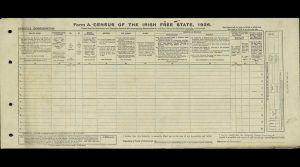

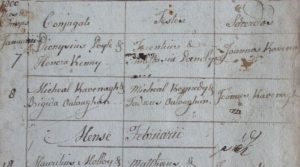

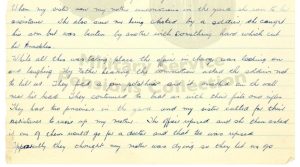
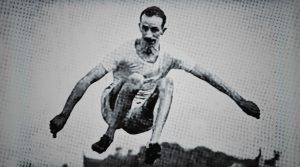

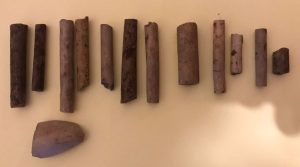
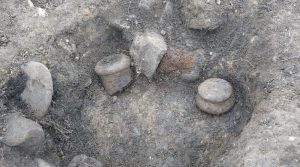
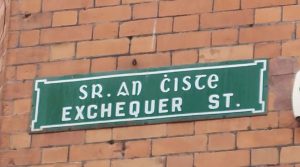


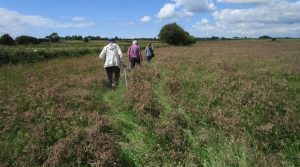
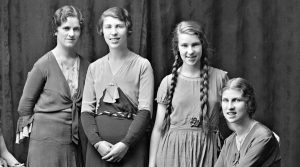
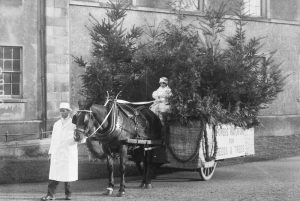
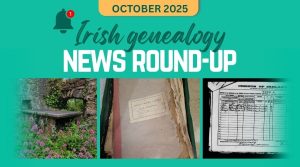


One Response
That would be a very compressive survey.